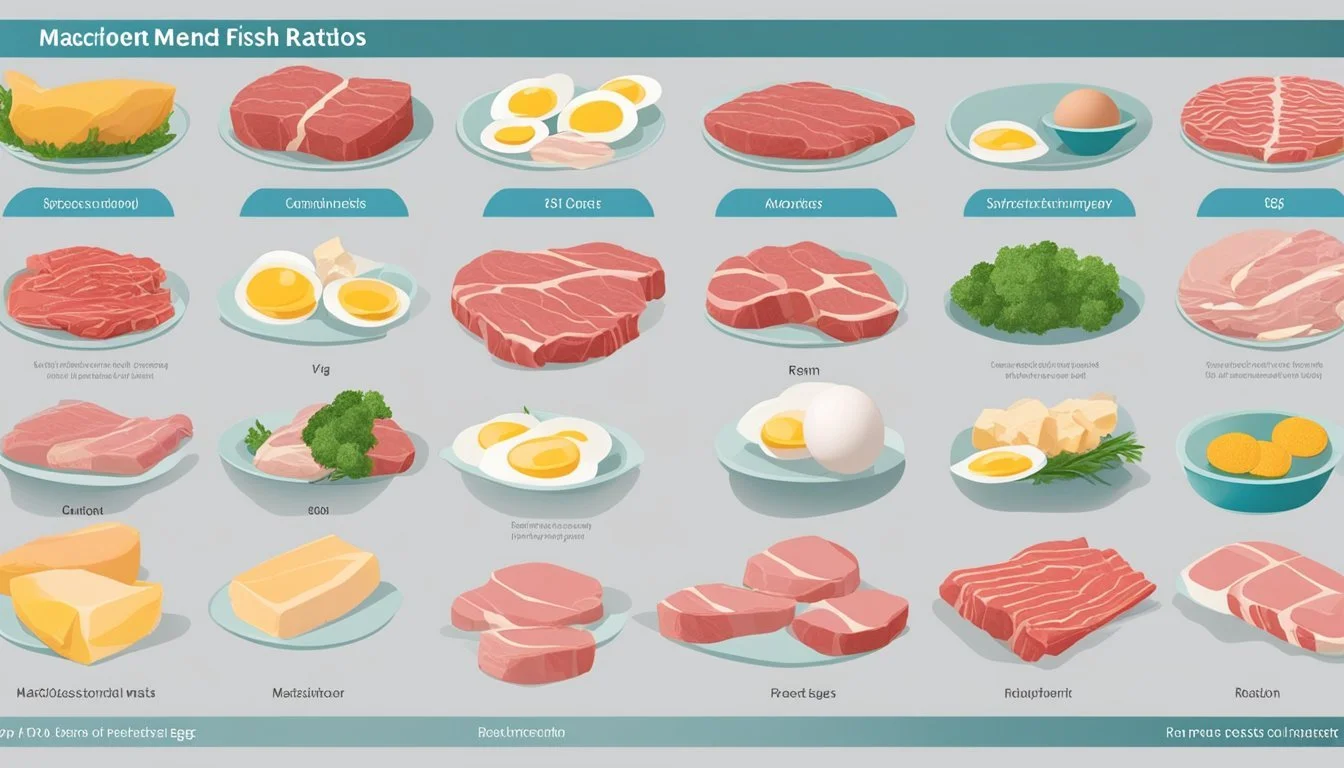Can You Chew Gum on Carnivore Diet
Compatibility and Choices
The Carnivore Diet, which primarily comprises all forms of meat and animal products, often raises questions regarding the inclusion of non-animal products, such as chewing gum. Adherents to this diet avoid plant-based foods, focusing instead on what they consider the most natural and health-supporting nutrients found in animal products. Chewing gum, while not part of traditional dietary staples, becomes a point of discussion for those looking for breath freshening options or a habit-forming activity that aids in concentration or stress relief.
Health considerations are paramount in any diet, and the Carnivore Diet is no exception. Chewing gum, in its sugar-free variants, is promoted by some people on this regimen as a beneficial aid in dental health by stimulating saliva production. This increased saliva flow can help reduce the presence of odor-causing bacteria in the mouth. However, most commercial gums include artificial sweeteners or plant-based ingredients, which would not align with the strict carnivore protocol.
Those who strictly follow the Carnivore Diet typically exclude chewing gum due to its non-animal origin and the potential presence of ingredients that go against the fundamental principles of the diet. Devotees argue that strict adherence is key to reaping the potential health benefits of this diet which focuses on high-protein and low-carbohydrate intake. As with any dietary practice, the consideration of individual health effects and nutritional beliefs plays a crucial role in determining what one incorporates outside of the core food list.
What Is the Carnivore Diet?
The Carnivore Diet is an eating plan focusing on consumption of primarily animal products while excluding plant-based foods. This section will delve into the core principles and variations of the diet.
Fundamentals of Carnivore Diet
The Carnivore Diet is rooted in the principle that human beings should consume only animal products. Enthusiasts believe that this diet aligns with the dietary habits of ancestral humans and can lead to various health benefits. The central components of this diet include:
Meats: Preference is given to high-quality, fatty cuts of meat including beef and pork.
Animal Fats: Suet, tallow, and other forms of rendered animal fat are incorporated for energy and cooking.
Dairy: A limited selection of high-fat dairy products, particularly those lower in lactose, such as butter and hard cheeses.
Eggs: Viewed as a nutrient-dense addition to the carnivore diet.
Fish: Encouraged for its omega-3 fatty acids and other vital nutrients.
The diet encourages consuming all parts of the animal, including organ meats, for a broad range of nutrients.
I always prefer buying tallow online because of the added convenience!
Variations of Carnivore Diet
While the standard Carnivore Diet is quite restrictive, there are some variations that allow for more flexibility.
Strict Carnivore: This version involves eating only meat, animal fats, and sometimes dairy. It excludes all plant matter and even avoids dairy for some.
Relaxed Carnivore: In this variation, small amounts of dairy, eggs, and fish might be included, recognizing their high nutrient density and the practical considerations of diet adherence.
Each individual may adjust their intake based on personal health goals, reactions to specific foods, and lifestyle.
Nutritional Profile of the Carnivore Diet
The carnivore diet emphasizes consumption of animal-based foods and typically excludes plant-derived nutrients, focusing instead on a distinct macronutrient distribution and a range of essential vitamins and minerals from animal sources.
Macronutrient Distribution
On the carnivore diet, the macronutrient distribution is heavily skewed towards protein and fat, as the consumption of carbohydrates is minimal if not nonexistent. Meat, which is a staple in this diet, is an excellent source of high-quality protein. Fat content varies depending on the cuts of meat, with options ranging from leaner selections like chicken breast to fattier cuts like ribeye steaks. This diet inherently advocates for a high intake of both saturated and monounsaturated fats found predominantly in animal products.
Vitamins and Minerals
The carnivore diet provides certain vitamins and minerals essential for the body, albeit from exclusively animal sources. For instance, Vitamin B12, crucial for nerve function and blood formation, is abundantly present in meat and organ meats. Iron, which is pivotal for transporting oxygen in the blood, is highly bioavailable in red meat. The diet may require careful planning to meet the vitamin C and calcium requirements, as traditional sources like fruits and vegetables are excluded. However, regular consumption of organ meats can mitigate the risk of certain nutrient deficiencies as they are nutrient-dense and provide a wide array of necessary micronutrients.
Online shopping for vitamin C and calcium is the smart choice for a seamless transaction!
Focus on Animal-Based Foods
The carnivore diet strictly consists of animal-based foods, which involves the ingestion of primarily meats—including beef, poultry, pork, and fish—and often includes eggs and select dairy products. A particular emphasis is placed on organ meats such as liver, kidneys, and heart due to their nutrient density, providing a concentrated source of vitamins and minerals. This approach to dieting is anchored on the belief that animal tissues offer all the necessary nutrients that the human body requires.
Health Benefits of the Carnivore Diet
The carnivore diet, which focuses on the consumption of animal products exclusively, is associated with several potential health benefits. These include weight loss, reduced inflammation, and improved digestive health.
Weight Loss and Metabolism
Individuals following the carnivore diet often report significant weight loss. This diet is typically high in protein and low in carbohydrates, which can lead to a metabolic state known as ketosis. In ketosis, the body becomes more efficient at burning fat for energy, which may aid in reducing body fat percentage.
Inflammation and Autoimmune Conditions
Constituents of the carnivore diet argue that it may decrease inflammation within the body. Since it eliminates many foods known to cause sensitivities, like grains and legumes, adherents often notice a reduction in symptoms associated with autoimmune conditions such as arthritis or lupus.
Digestive Health
Improved digestive health is commonly mentioned by those on a carnivore diet. The exclusion of fibrous plants and grains can lead to reduced bloating and digestive distress for some individuals. The diet's simplicity may also allow the digestive tract to process food more efficiently.
Potential Risks and Considerations
When considering chewing gum on a carnivore diet, one must weigh potential nutritional risks and long-term health implications. This diet is restrictive, and any additions, including gum, should be carefully evaluated.
Nutritional Deficiencies
A carnivore diet primarily focuses on animal products and typically excludes plant-derived ingredients, which can lead to a lack of fiber and certain micronutrients typically found in a more varied diet. Chewing gum, especially types that are free of sugars and artificial sweeteners, is often considered inconsequential in terms of macro- and micronutrients. However, if not carefully selected, gum can introduce unwanted plant-based ingredients or artificial additives, inadvertently causing an imbalance or reaction in the strict dietary regimen. Attention must be given to the ingredient list to avoid anything beyond animal-derived content.
Long-Term Health Risks
Long-term adherence to a carnivore diet has been a topic of discussion among health professionals, primarily concerning the risks associated with heart disease due to potentially high intake of saturated fats and cholesterol. Incorporating non-nutritive items like sugar-free gum raises questions regarding the ingestion of artificial chemicals or sweeteners that might contribute to other health concerns or toxins over time. Furthermore, strict carnivore diets that exclude fiber might contribute to digestive issues, and it is unknown how sugar-free gum might interact with such a restricted dietary pattern. It’s important for individuals on a carnivore diet to monitor their health closely, ensuring they do not develop deficiencies or increasing the risk of diseases due to the diet's constraints.
Carnivore Diet and Oral Health
The carnivore diet, which excludes plant-based foods and carbohydrates, may significantly influence oral health. This section examines how the diet affects teeth and gums and evaluates sugar-free gum's role in oral hygiene.
Impact on Teeth and Gums
On the carnivore diet, individuals primarily consume animal products, a regimen that inherently eliminates sugars and most carbohydrates. This diet could lead to a reduction in tooth decay and gum disease, as these conditions are often exacerbated by sugar and starch-rich foods that encourage the growth of decay-causing bacteria in the oral cavity. Research indicates high-protein, low-carbohydrate diets may positively balance oral bacteria, crucial for preventing oral health issues.
Sugar-Free Chewing Gum and Oral Health
Chewing sugar-free gum is considered favorable for oral health because it stimulates saliva production. Saliva is an essential factor in maintaining oral hygiene, as it helps to rinse away food particles, neutralize plaque acids, and reduce bacteria that cause bad breath and cavities. For those on a carnivore diet, sugar-free gum can be an ancillary tool for oral health, as long as it contains no plant-based ingredients or artificial sweeteners that could counteract the diet's principles.
Inclusion of Chewing Gum in the Carnivore Diet
While the carnivore diet primarily focuses on animal products, chewing gum opens a discussion about permissible indulgences. This section examines chewing gum’s alignment with carnivore principles and its potential impact on digestion and cravings, pertinent to maintaining strict dietary adherence.
Compatibility with Carnivore Principles
The carnivore diet is stringent, emphasizing the consumption of meats and animal products while excluding plant-based foods. Chewing gum generally falls outside the diet's standards, since it often contains plant-derived ingredients. For strict adherence, individuals must select gum that is free from sugars and sweeteners, such as xylitol, which is derived from birch trees or corn. Even sugar-free gums are typically synthetically flavored or sweetened, hence purity is a key consideration for compatibility.
Effects on Digestion and Cravings
Chewing gum can influence saliva production, which aids in oral cleanliness by helping to neutralize and wash away oral bacteria. This can lead to improved dental health. However, some sugar alcohols commonly found in sugar-free gums, including xylitol, could disrupt the gut microbiome or cause digestive discomfort if consumed in excess. For those on the carnivore diet, an occasional piece of gum might serve to satisfy cravings for something sweet without a significant deviation from diet principles. However, it's important to monitor one's response closely to ensure no adverse effects occur on digestion.
Carnivore Diet in Daily Life
Adopting a carnivore diet requires thoughtful meal planning and lifestyle adjustments to accommodate a new way of eating that focuses solely on animal products. This section explores the intricacies of incorporating such a diet into daily routines and social settings.
Meal Planning and Preparation
When someone embarks on a carnivore diet, their meal plan simplifies as it revolves around animal-based foods. Key components often include grass-fed meats for their higher omega-3 content, organic options to avoid additives, and whole cuts over processed meats.
Cooking becomes a practice of minimalism, frequently involving techniques such as grilling, roasting, or pan-frying. The use of lard or tallow is common, as these animal fats are prized for cooking due to their high smoke point and flavor.
Seasonings are usually limited to salt and sometimes pepper, keeping in line with the carnivore philosophy.
Condiments, if used, should be free of plant-based ingredients, which excludes most traditional options.
Dairy products, when included, are typically high-fat and low-lactose, like cheese and butter, and they are often sourced to ensure they are grass-fed.
Lifestyle Adjustments and Social Implications
Individuals following a carnivore diet often find social implications attached to their dietary choices. Eating out can be navigated by opting for simple meat-based dishes such as steaks or seafood and requesting the removal of non-carnivore garnishes and sides.
Lifestyle adjustments for someone on a carnivore diet may encompass having to explain their eating habits in social gatherings or possibly declining certain food offerings that do not align with their dietary restrictions. There is an increased requirement for understanding the sources of their food, prioritizing quality, such as grass-fed and organic meats, and transparency in preparation methods.
Carnivore Diet and Other Dietary Frameworks
The carnivore diet is a restrictive regimen centered on animal products and excludes most other food groups, which contrasts with other diets that allow for a broader range of foods.
Comparison with Keto and Paleo Diets
The carnivore diet is often compared to the ketogenic (keto) diet and the paleo diet due to their emphasis on reducing carbohydrate intake. However, there are key differences.
Ketogenic Diet: The keto diet aims for a high-fat, moderate-protein, and low-carbohydrate intake to achieve ketosis, where the body burns fat for energy. It incorporates healthy fats such as avocado, along with nuts and seeds, while strictly limiting but not eliminating carbohydrates.
Paleo Diet: The paleo diet is based on foods presumed to be available to Paleolithic humans. It includes lean meats, fish, fruits, vegetables, nuts, and seeds — food groups largely obtained through hunting and gathering. Paleo excludes grains and legumes, based on the belief that these agricultural products were not part of early human diets.
Both the keto and paleo diets include plant-based foods such as vegetables, nuts, and seeds. The carnivore diet entirely removes these food groups, focusing solely on animal products which can create limitations for individuals seeking a varied source of vitamins and minerals derived from plant-based foods.
Transitioning from Plant-Based Diets
Transitioning from a plant-based diet to a carnivore diet involves significant dietary changes, particularly for individuals accustomed to consuming a variety of fruits, vegetables, grains, and legumes. While a plant-based diet emphasizes the consumption of a diverse array of plant foods rich in fiber and phytonutrients, the carnivore diet excludes these, focusing only on meat, fish, eggs, and certain dairy products.
For someone used to a plant-based diet, it is important they understand the potential impacts of eliminating:
Vegetables and Fruits: Sources of essential vitamins, minerals, and fiber.
Grains and Legumes: Important for dietary fiber, B-vitamins, and other nutrients.
Nuts and Seeds: Nutrient-dense foods providing healthy fats, proteins, and fiber.
Despite the drastic reduction in food variety, individuals transitioning to a carnivore diet should consider their nutritional needs and the potential need for supplementation or dietary adjustments to maintain a balanced intake of essential nutrients.
Carnivore Diet Advocates and Resources
The Carnivore Diet, focusing on consuming animal products exclusively, has garnered a dedicated following. Supporters seek guidance from figures experienced in the field and communities dedicated to health goals and dietary choice conversations. Here, we explore the experts advocating for the Carnivore Diet and the platforms that facilitate community support.
Prominent Figures
Dr. Shawn Baker stands out as a leading advocate for the Carnivore Diet. A former orthopedic surgeon, Dr. Baker promotes the diet's potential health benefits, including its simplicity and the anecdotal reports of improved health markers. He is vocal about his own positive experiences, which has played a significant role in popularizing this dietary choice.
Support and Communities
MeatRx emerges as a pivotal resource for individuals seeking community support around the Carnivore Diet. The platform offers a range of content and services, from coaching to success stories, highlighting the diet's impact on various health goals.
Community Support is a vital component of dietary success. Online forums, social media groups, and dedicated websites provide spaces for enthusiasts to share experiences, challenges, and strategies for sticking to the diet's strict regimen. These communities value the sharing of empirical results and personal journeys, offering newcomers a grounding in what to expect.
By drawing on these advocates and resources, individuals interested in the Carnivore Diet can make informed decisions and find the support necessary to explore this dietary path.











